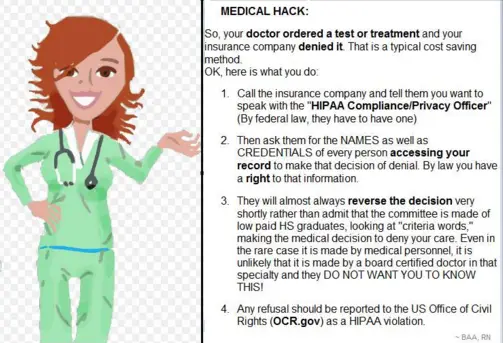HIPPA Medical Hack for Denied Insurance Claims-Truth! & Fiction!

Summary of eRumor:
It’s been rumored that there’s a HIPPA medical hack to reverse insurance claim denials that will save patients money on non-covered medical tests or treatments.
The Truth:
This HIPPA medical hack claim falls into almost every category: truth, fiction, misleading and unproven.
In short, it’s not among strategies recommended by health professionals to appeal an insurance company’s decision to deny an insurance claim.
Probably the best way to go about that is to follow procedures for claim denial appeals that were established under the Affordable Care Act (aka Obamacare). First, you can file an internal appeal that requires your insurance provider to provide more information about why your claim was denied so you can (hopefully) make corrections. Then, if you’re still unsatisfied, you can move forward with an independent, external appeal to settle the matter.
The HIPPA medical hack claim surfaced in December 2015 on Facebook, which is not a great place to get medical advice. The so-called HIPPA medical hack outlines four steps that (it claims) will force insurance companies to reverse claim denials to avoid HIPPA compliance laws:
Let’s start with the first point. Insurance companies have compliance programs to ensure that federal regulations (like HIPPA) are followed, but they’re not “required” to staff a HIPPA compliance officer under the Health Insurance Protection and Portability Act, as is claimed in point 1. Titles of compliance officers will likely vary from company to company, and a compliance officer would likely refer you to the internal appeal system.
Also, when it comes to requesting information about an insurance claim denial, you should look to the Employee Retirement Income Security (ERISA) Act of 1974 — not HIPPA, as claimed in point 2. A provision of ERISA details your right to access information pertaining to claim denials:
The regulation provides that, in order to allow claimants a reasonable opportunity for a full and fair review of their claim, a plan’s claims procedures must provide for the identification of medical (or vocational) experts whose advice was obtained on behalf of the plan in connection with an adverse benefit determination, without regard to whether the advice was relied upon in making the determination. Under the rules, plans are not required to automatically provide, as part of a notice of an adverse benefit determination or otherwise, the identity of experts consulted during the claim determination process. Nor are plans required to disclose the name of experts in the absence of an adverse benefit determination. On the other hand, consistent with the procedural requirements of the regulation, the plan must provide the identity of any such experts when requested by a claimant in connection with an adverse benefit determination. See § 2560.503-1(h)(3)(iv) and (4).
So, it’s true that insurance companies are required to provide information about experts who were consulted in making their decision to deny your claim — but the nuts and bolts of that fall under ERISA, not HIPPA.
Point three claims that “low paid HS graduates” make policy denial decisions at insurance companies, and that’s where this rumor ventures into “unproven” territory. It’s impossible to verify the backgrounds of individuals who work at private insurance companies — but it’s wrong to assume that they’re all “low paid HS graduates.”
Finally, in point four, the HIPPA medical hack claims that HIPPA violations should be reported to the U.S. Office of Civil Rights, which is correct. The agency states that complaints may be filed if your “health information privacy rights” have been violated.
